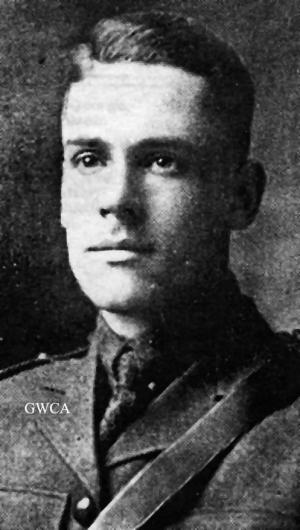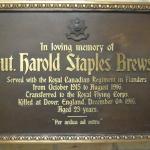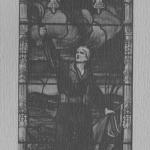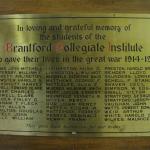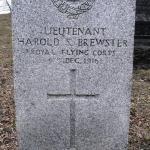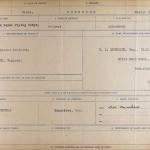Circumstances of Casualty: Aeroplane Accident.
Location of Unit at Time of Casualty: Dover, England.
BX December 7, 1916
Local Aviator Killed at Dover, Machinery Broke – Flight Lieutenant Harold Staples Brewster Was Making His Final Trial Flight
Just after they had received a cablegram from Flight Lieutenant Harold Staples Brewster that he was leaving England on Saturday next to spend the Yuletide in his home circle, Mr. and Mrs. W.S. Brewster of this city received word officially from London and Ottawa that their son had been accidentally killed while making his last trial flight at Dover to fit him for active work with the Royal Flying Corps, which he was training. The entire family was stricken with grief, and to them in their bereavement goes the heartfelt sympathy of the entire community. Lieut. Brewster was physically and intellectually almost perfect, standing over six feet in height and being a graduate in arts of Toronto University.
Lieutenant Harold Staples Brewster was the eldest son of W.S. Brewster, ex-M.P.P. for South Brant, and was very well known in this city, having attended the local public schools and the Collegiate Institute. He afterwards attended the Toronto University, there graduating in arts, and at the same time qualifying in the University Officers’ Training Corps. There he took a deep interest in athletics, especially in swimming, being a member of the university champion water polo team. He enlisted with 36th Battalion, C.E.F. (Lt.-Col. E.C. Ashton commanding), while it was quartered in Hamilton, in May, 1915. He was with the battalion when it arrived in England, but afterwards was transferred to the Royal Canadian Regiment. With that battalion of Canadian regulars he went through the famous attack by the Germans on the Canadian lines at Ypres, the R.C.R.’s being one of the four regiments, which held the front lines in that strenuous battle, during which the Canadians saved the day, keeping the Germans back from Calais. He afterwards took part in the counter-attack of the Canadians, which resulted in the regaining of the lost ground, and which cost so many lives. Though in the thick of the fighting, he received but a minor wound on the arm.
He remained with the battalion until August last, when he was transferred at his own request to the Royal Flying Corps, it being his ambition to become an observer, feeling that he had particular qualifications for this work. He passed the technical and theoretical examinations at Reading and went to Netheravon, where he also was successful. Then he went to Dartford, to complete his aerial education, and he was making what was to have been his last trial flight, when something went wrong with the machinery of his aeroplane and the machine fell, he being killed.
The news came yesterday at noon but Mr. Brewster was out of the city and the message was held until his return. The news leaked out however, and it was rumored around the city last evening that Lieut. Brewster was killed. This was thought to be wrong, there being no definite word available, but it was only too true. Mr. Brewster returned last evening and then learned the sad news.
The bereaved parents, one brother, Walter, now a student at the local collegiate institute and four sisters Constance, of Regina, and Marion, Isobel and Madge at home mourns his loss.
An attempt is being made to have the body brought to his home for interment. As the death did not take place in the firing lines it is thought that this will be possible. Instructions to this end were wired to the Old Land this morning.
BX December 7, 1916
Death of Lieutenant Harold Staples Brewster
One of the saddest bits of news, which has reached Brantford since the outbreak of the war, is that of the fatal accident which has befallen Flight Lieutenant Harold S. Brewster, son of W.S. Brewster, K.C. Harold Brewster was a splendid type of Canadian manhood, and one who felt called upon, by a high sense of duty, on the very outbreak of the war; to risk all that life holds dear in the service of his country. And now he has paid the supreme sacrifice, but his sacrifice will not have been made in vain if it spurs other young Canadians to a sense of their responsibility and the need of repairing the wastage, which, from day to day, this awful war is occasioning.
To Mr. and Mrs. Brewster The Expositor desires to extend its heartfelt sympathy in the inexpressibly sad news which has come to them, and in the disappointment over the expected Christmas home-coming of one so near and dear to them.
BX December 11, 1916
To Be Sent Home – Remains of Late Lieutenant Harold Staples Brewster are to be brought to Brantford
It had been expected that the remains of the late Flight Lieutenant Harold Staples Brewster would be interred at Dover on Saturday last, but a cablegram received this morning by Mr. Brewster from Major Jordan intimates that the body will be sent home. It is to be presumed, however, that the funeral service was held at Dover, as originally announced.
BX December 18, 1916
Impressive Memorial Service for Flight-Lieutenant Harold Staples Brewster – Chancellor Bowles of Victoria College, Paid Tribute to the Young Hero
Honored in Death
As the strains of the “Dead March in Saul” filled the Brant Avenue Methodist Church at the conclusion of the solemn, impressive service last evening the tense, silent and soul thrilled assembly which had gathered to pay tribute to the memory of another young hero, reverently stood with bowed heads and wet eyes and then slowly and sadly filed out homeward. Another Brantford boy – Lieut. Harold S. Brewster – has sacrificed his life that liberty might live, and fitting, deserved encomiums were last evening offered to his memory by Rev. Chancellor Bowles of Victoria College, Toronto, from which institution he had recently graduated.
Chancellor Bowles
“Nothing but an absolute necessity would have kept me from coming to take part in a ceremony to the memory of one of the best boys who recently graduated from Victoria College,” declared Chancellor Bowles, chancellor of the college in beginning his sermon. In a masterly style he dwelt upon the trying day and time of testing through which this country was passing. Taking his hearers back to the days before August 1914, he referred to the faith all had in the Empire and its ideals of Christianity and humanity. The growth of liberty was being watched and the spread of knowledge and patriotism with a Christian outlook. A new imperialism was dawning, and all were dreaming of peace, so the Empire seemed to be the home of liberty and the champion of the rights of all nations. Of course, evils were seen, but Britain was sound at heart, and essential to civilization and the Kingdom of God. A young Empire had been growing all this time in the heart of Europe. The German peoples had found unity, were vigorous and highly educated. They were thorough going and organized and with ideal from the past of conquest, reading history as a biological process this nation challenged and defied our faith. It laughed at our freedom. Her liberty was the liberty of national evolution, her neighbors were enemies. Then in August 1914, came war. Since then we had learned much, and we had amongst other things learned that our ideals of liberty for the citizen and justice and fraternity for all nations were threatened, were in peril of being driven from the earth. At first, few were able to take in the situation. Some felt the thrill of battle perhaps, but only a few. A feeling of gloom, sadness and depression settles upon us. The days grew darker and no cataclysm of nature could have shocked us so.
The Hero Dead
Mr. Bowles then congratulated our hero dead. Canadians were no military people. Poets did not sing nor do historians or philosophers write of the glory of war. Things gradually adjusted themselves. The bugle call was heard, the call to young manhood; the call of justice and liberty. There was a speedy rallying and they crossed the seas and held the line. “What else could they do?” He asked.
Going Meant Much
“They’re going has meant much to us,” said the speaker, who then gave some thoughts which were precious to him through the conflict. He had learned better how to esteem the young manhood. They were never before tested; they had been brought up under easier conditions than their fathers. A serious question was; “They have been brought up in more elegant fashion with more refined manners, but are they the equal of their fathers?” Only one answer could be given to this and the noble response to the highest ideals was the reply. Other thoughts dwelt upon the speaker were that we had learned the elemental goodness of humanity and that we had learned to love our men.
A High Tribute
Chancellor Bowles then spoke as follows: “In the year 1910 Harold Brewster, in the 18th year of his life entered an honors course in Victoria College. His first and second years were in moderns, the third and final years in Political Science. In both these courses he did good work and attained in his examinations uniformly high standing. The change from the study of Moderns to that of Political Science was probably an indication of the awakening of new ambitions, and the attaining of a new outlook on life. Henceforth the study of law, with its opportunity of a life of public service to the community, lay before him and the vexed question of life’s vocation was evidently solved. After graduation in 1914, he entered law and passed his first year at Osgoode, standing third in the list of the year, which certainly was a very high distinction. It was at the close of this year that he heard so distinctly the call to serve his country in the great struggle proceeding in Europe. The call came to him with instant urgency and power, and he grew restless and uneasy. He could not maintain his own sense of self-respect and remain at home pursuing his work, when he knew his place was at the front, and so, enlisting as an officer, he soon found his way to the firing line. There he passed through experiences, which I could not, and would not if I could, undertake to describe to you. He tasted war in its bitterness, he shared in its hard, tragic realities, and such experiences as our returned soldiers by their silence tell us are not to be paraded in public. Sufficient that he was with his men in the most trying ordeals of battle, two of them, as he has written, died in his arms. It was after about six months of this fierce testing that he returned to England to take out a commission in the flying corps. That he should have been drawn to this form of the service is evidence, I think, of the spirit and mind that was in him. To fly on the wings of the wind, to pierce the cloud, to soar like eagles, in scorn of the lower things of earth, all that appears to me the highest metaphor of spirit daring and aspiration. Of downward forces this was the defiance, of earthly attraction this was the conquest. To read the inner workings of the mind and heart of these daring young men who serve the Empire in the air is not difficult, I think, for any of us. Danger only fascinates and enthralls, when he who faces it knows that he is serving in the very highest capacity the great cause of Empire, knows that one skillful, resourceful aviator is worth many soldiers on land. However, before our young friend, our young hero (for these men are all heroes) had been able to render this great service for which he was preparing himself, he gave himself in the supreme sacrifice of death.
It would be difficult for me tonight to speak in too high terms of the impression made by Harold Brewster on the whole life of the college, alike, on members of the faculty and on his fellow students. He entered college quiet and reserved in manner, and from the beginning commanded the admiration and respect of all. This admiration and respect in the inner circle of his college friends grew to warm, affectionate attachment. Each year saw the number of his friends grow, and he left college one of the best known, most highly respected and genuinely beloved of our students. The years at college were growing years. College life had a profound influence upon him, arousing his mind to new activities and problems, awakening the consciousness of dawning powers and new aspirations and ambitions, begetting a deeper self-reliance and bringing near the splendor of the greater ideals of life. All these were seen at work in the making of the character of Harold Brewster. One of his friends who knew him well has said: “I never heard from him a coarse, rough word, an unbecoming jest. He was faithful, self-restrained and hard working. He gave his mind to his tasks and had a great capacity for grasping details and organizing his thoughts, a capacity which would surely, in one of such high character, had he been spared, have placed him in the front ranks of his chosen profession.” To one of his intimate friends he wrote from the trenches how glad he would be to get home again to his work. He told him what he had endured, told him of bitter tragedies in which he had been called to play his part. But there was no complaining or murmuring; facing clearly the possibility that he might never return, and at times to him the possibility seemed a great probability, he still declared, “Had I to do it over again, I would do it.” Those are his very words. I can conceive no nobler words, when written from the awful hell of battle. He had not gone to the front as a piece of wild adventure, he had not gone thirsting for revenge or honor or fame, but under the great leadership of that duty which is liberty and law, the strength alike of the earth and of the heavens.
“I bring today the affectionate tribute of his Alma Mater, and I speak what I believe is the honest sentiment and feeling of all the students who knew him in the college.”
Special Music
Rev. A.A. Bowers, the pastor, assisted at the service last evening. Special music, appropriate to the solemn occasion, was rendered by the choir. The musical program being as follows:
Anthem, “There is No Sorrow Lord, Too Great” Godfrey
Anthem, “Crossing the Bar” Woodard
Solo, “O Rest in the Lord” Mendelssohn, Miss Gladys Garvin
Anthem, “Lead, Kindly Light” Pughe-Evans
BX December 26, 1916
Interment with Military Honors
With fitting military honors the funeral of the late Flight Lieutenant Harold Staples Brewster will take place from Brant Avenue Methodist Church on Thursday next at the hour of 3 o’clock. Rev. W.H. Harvey of St. Thomas will assist in the service. Lieut. Brewster’s body arrived at St. John on the S.S. Metagama on Sunday evening, and will be sent direct to his home here.
BX December 27, 1916
Arrangements For Interment – Funeral of Flight-Lieutenant Harold Staples Brewster Will be Impressive
The remains of the late Flight Lieut. Harold S. Brewster, who nobly gave up his life in the performance of duty, arrived in the city this morning on the 9.37 train from the East. With fitting military honors the funeral will be held tomorrow afternoon. Divine service, at which Rev. W.H. Harvey of St. Thomas will assist, will be held in Brant Avenue Methodist church at the hour of 3 o’clock. Interment will be made in the family plot at Greenwood cemetery.
Extensive arrangements are being made for the last rites of this noble young aviator. The Soldiers’ Aid Commission requests the returned soldiers in the city to turn out in uniform, for the purpose of attending the funeral, they are asked to meet at the armories at the hour of 2.15. Mayor Bowlby has requested the aldermen of the city to attend in a body. Automobiles will be provided and the aldermen will meet at the city hall at 2.45. The 215th Battalion will also take part.
BX December 29, 1916
Military Funeral Was Impressive – Remains of Flight-Lieutenant Harold Staples Brewster Were Laid to Rest – With Military Honours
Full military honours were accorded the remains of Flight Lieutenant Harold S. Brewster of the Royal Flying Corps – who was accidentally killed at Dover, England, early in December, through the machine in which he was making his last trial flight falling – which were interred in Greenwood cemetery yesterday afternoon. Hundreds of citizens and the 215th Battalion paid their last respects to an officer who had given his all for his country.
The remains were taken to the Brant Avenue Methodist Church during the morning. Long before 3 o’clock, the hour set for the service the church was crowded. The members of the 215th Battalion and the band were lined up outside during the ceremony. Another large crowd followed the cortege to the grave and the services at both places were impressive.
Rev. W.H. Harvey of St. Thomas, a former pastor of Brant Avenue Methodist Church, took the services and was assisted by Capt. S.E. McKegney, chaplain of the 215th Battalion. The 215th Battalion furnished their band, the firing party, which was in charge of Lieut. F. Lyle and the gun carriage upon which the dead officer’s remains were borne to the burial place. Six officers of the 215th Battalion, Lieutenants Gundy, K. Wood, Watt, F. Wood, Sweet and Sutherland, acted as pallbearers.
A large number of returned soldiers, the City Council and the board of education attended and occupied the centre of the church, where the officers of the 215th Battalion were also seated during the service. The coffin at the front of the church was draped with a big Union Jack and was covered with a profusion of beautiful flowers.
It was a few minutes after 3 o’clock when Rev. A.A. Bowers commenced the service. Rev. Mr. Harvey, who was at one time Lieut. Brewster’s pastor, preached and paid glowing tribute to the dead hero’s worth. In remaking on the age of distress, he stated that it was also an age of heroism. At the outbreak of war it was felt here that success to the arms of the foe would mean that we should be bound in the chains of slavery. The cost he thought would have been much sadder had not Great Britain been true to her word. It was one of the most righteous wars ever waged and the speaker thought comfort could be derived from the realization that the cause for which the boys were laying down their lives was a righteous one. The call then came to the boys of the Dominion and they splendidly and spontaneously responded. Already 370,000 had answered. They went overseas to fight, not to give England more territory, but to make a sacrifice for the world’s good. It came to pass that the young hero who lies before me heard his country’s call. I knew this boy. We all knew him and loved him. I saw him in his boyhood days around this altar seeking his God, commented Mr. Harvey. It came to pass then that he went out into life. He had a brilliant college career and then went into law and then the call of his country came. Just as life was opening up before him and success was in sight he gave up his life. “I envy that home,” said Rev. Mr. Harvey, “for the boy that has made the supreme sacrifice. That home has made one of the costliest gifts ever laid on the altar.”
In concluding his remarks Mr. Harvey gave a number of reflections. Honour, he said, was more precious than life, and that was the principle of Harold Brewster. Life did not consist of the number of years that a person lived. “Let me say that God is far from disappointed in that life that has put such faith in him. A life like that is not disappointing,” he commented. The occasion was one, the speaker pointed out, that called for everybody to measure up to life’s highest duty. That afternoon the Empire was bound together by closer ties – those who had laid down their lives. While all could not die for the Empire, they could all live for the Empire’s good.
After the ceremony, with the firing party leading and followed by the band playing “The Dead March in Saul,” the sad procession wended its way down Brant Avenue to West Street and thence out to Greenwood cemetery. Following the band was the gun carriage drawn by men in khaki, the pallbearers being on either side.
Immediately behind the gun carriage were the returned heroes, and in a carriage the principal mourners. A number of other carriages contained the aldermen, board of education members, other prominent citizens and the 215th Battalion. All along the way people thronged the streets despite the bitter cold.
The firing party and band lined up at both sides of the road at the entrance to the cemetery and faced inwards. The body was then carried to the grave and the mourners followed. Following the reading of the funeral service, the firing party fired three volleys over the grave and the buglers sounded the “Last Post.”
BX May 12, 1919
Memorial Tablet Was unveiled – Brant Avenue Church Honored Memory of Flight Lieutenant Harold Staples Brewster
In Loving memory of
Lieut. Harold Staples Brewster,
Served with the Royal Canadian
Regiment in France from
October, 1915 to August, 1916
Transferred to the
Royal Flying Corps
Killed at Dover, England
Aged 23 Years
“Per ardua ad astra”
Inscribed with these significant words that include all the needs to be said a tablet of enduring bronze was unveiled in Brant Avenue Methodist Church on Sunday morning in memory of the young Flight-Lieutenant Harold Staples Brewster, whose life was given in the Great Cause. Major Henri Kew Jordon, who returned from France, only a week ago, unveiled the tablet.
The morning services were beautifully arranged by Rev. J.D. Fitzpatrick, pastor of the church. The sacred words of the “Recessional” were first sung, followed by “Rock of Ages.” Major Jordan spoke of the office of honor he had to perform. Lieut. Brewster, he said, was one of the first Brantford boys to respond to the call; he had seen a heavy share of fighting in Flanders before he returned to England and joined the air force. The brief, but deeply sad annal was then revealed to all when he uncovered the tablet.
“It would stand as an inspiration to all the boys of Brant Avenue Church in years to come,” rev. Mr. Fitzpatrick said in his sermon, for which he chose the subject, “The Stewardship of Life;” and it would be a reminder of the men of the church of their highest duty.”
The pastor offered a very touching and appropriate prayer, and Miss Gladys Garvin sang “My Redeemer and My Lord.” The tablet was erected by the father of the fallen hero, Mr. W.S. Brewster. It is placed under the first window in the body of the church on the left side.
Lieut. Brewster was a splendid specimen of young manhood. He was physically almost perfect, standing over six feet high. He was a graduate in arts from the University of Toronto, and was especially interested in athletics, being a member of the university champion water polo team.
He enlisted in Hamilton with Lieut.-Col. E.C. Ashton in the 36th Battalion, but afterwards was transferred to the Royal Canadian Regiment. He went through the famous attack by the Germans on the Canadian lines at Ypres and the strenuous counter-attack, which stemmed the German rush to Calais.
At his own request he was transferred to the Royal Flying Corps with the ambition of becoming an observer. He was making his last trial flight at Dover when he fell and was killed on Dec. 6, 1916. He had obtained leave to spend Christmas at his home just before the fatal accident.
BX September 27, 1920
Memorial Window to Heroic Fallen Unveiled at Brant Avenue Church – Chancellor Bowles of Victoria College Officiated at Official Recognition of Nine Members of the Church Who Gave Their Lives in the Great War – A Ceremony Pregnant With Meaning
In dedication to the nine men of Brant Avenue Methodist Church who gave their lives in the Great War, a memorial window was unveiled in that church at the morning services yesterday. Rev. Chancellor Bowles of Victoria College, Toronto, gave the message of consolation to the friends of the soldiers whose memory he extolled and Major A.E. Lavelle, D.D., and Major E. Sweet both in uniform, unveiled the window. The congregation filled the church to the last pew and each one could not fail to receive, from the simple and impressive ceremony, a strong, new motive for keeping alive what Chancellor Bowles called a great and glorious memory.”
Deeply impressive and heart soothing was the whole ceremony. Rev. J.D. Fitzpatrick, the pastor of the church, was in charge and the choir gave special music, including solos by Miss Reba Force and Miss Margaret Stephen, the latter of Toronto. The military significance of the event was emphasized by the number of men attending in uniform. Besides Major Sweet and Major Lavell, places of prominence were given to Col. M.A. Colquhoun, D.S.O., C.M.G., Lieut.-Col. M.E.B. Cutcliffe, Major Jordan, Lieut. K.V. Bunnell, Lieut. Donald Waterous, Lieut. Charles Sheppard, Capt. (Dr.) Leonard Coates, Capt. Dufferin Slemin, Lieut. Fred Pinnell, Capt. Morley Verity and Sergt. James Hitchon, Nursing Sister, Captain Annie Hartley, was also present.
The Decorations
A special committee had spent much time in making the church beautiful, draping the chancel in flags and wreathing maple leaves over the window and around the memorial tablets formerly erected. Bouquets of mauve and white and pink and white asters were placed on the sill of the window.
The Sermon
Following the solemn prayer by Rev. J.D. Fitzpatrick and the choir offerings, Rev. Chancellor Bowles preached a most impressive sermon.
The dedication of the memorial, said Dr. Bowles, was promoted by instincts of love and gratitude and loyalty that sought to keep in recollection the names of those who were gone, their voices, their faces and the deeds they had done. Thoughts of them were like a benediction after prayer, for memories such as theirs soothed and elevated and enriched men’s lives and kept them in touch with the living past. Many memorials were being erected, he said, from simple tablets to costly community halls, churches and arches; yet the outward form mattered little, what counted was the appreciation and admiration of those who raised them. Every memorial was erected “Lest we forget.”
It was not likely this generation would ever see such another war, it was the grimmest and most awful thing men had ever faced; they had been overwhelmed by its terrible destruction and death. This ceremony was held to lead others to know its meanings and learn its lesson well – “Lest we forget.” Drawing his bearers to think of the many elements that entered into the cause of the war, the struggle, said the Chancellor, had written its own inner meaning. Humanity could live in safety on this earth only as a spiritual and moral force; there must be a right relationship among the nations; men had come to feel the sense of the ultimate value of what was right and what was fair. “We know what conceptions and ideals moved our boys,” Dr. Bowles went on. “They had the sense of human value. Most of them were scarcely young men, they were only boys. Life had no problems for them yet; the iron had not entered into their souls. Now they make one small portion of those who like in Flanders’ Fields. They had not lived their lives as some listening to me have almost done, they poured out the wine of youth, life’s passions; nor” he said, “will you cease to think of them as young and fair. From the many letters I read written by Victoria College students, I was struck by the cheer and the steadfastness to duty they expressed. From one I have here, written to the soldier’s mother, before the great struggle of August 8, he concluded, ‘a great triumph will take place and I shall have a part in it.’ Remember”, said the Chancellor in closing “that was the spirit that actuated them through it all.”
The Unveiling
Major Lavell and Major Sweet conducted the unveiling ceremonies, the former giving a brief address and the latter reading the names and drawing aside the Union Jack which covered the memorial window.
In beginning his remarks Major Lavell referred to Major T. Harry Jones, who had so much to do with the memorial window, but who had not lived to see the completion of the work. He said that out of the many thoughts that crowded in upon his mind there were but three he had time to express. The first was the sorrow that those present must feel who were nearest and dearest to the men whose names were on the memorial. This sorrow and perplexity at death was as old as the race. To this sorrow he had little to give but sympathy. Possibly if they would find the secret of Calvary and see our Lord’s death as victory and not defeat, they would have light and much comfort. The second was that the front line areas made a school the like of which existed nowhere else. It tested, disciplined and changed every man. They learned to know real values, what was worth retaining and what might be well given up. The third was that these brave young men having passed through this school that most of those present had not passed through, and therefore knew not, willingly faced death and died doing their duty, which to them was far preferable to mere living. Could their loved ones here not have faith in their faith and even in their sorrow and ignorance believe in the light seen by those who had fearlessly walked through the valley of the shadow?
Major Lavell quoted from Sir Arthur Currie’s message to the Canadian soldiers, delivered on March 27, 1918. How true, he said, his finals words had become and how appropriately they had been chosen for the inscription on the window: “You will not die, but will step into immortality.”
Impressively and clearly Major Sweet read the roll of those whose names were inscribed on the tablet:
Harold Staples Brewster
Alexander Finletter Brown
Hugh Dalton Livingston
Lawrence Wilmot Livingston
Joseph Howard Pinnell
Earl Pettit Pitcher
Harold Brant Preston
Frederick Stanley Schell
Egerton Vaughan
As the window was revealed and the names were called, the notes of the “Last Post” were sounded by Sergeant Beech of the Dufferin Rifles.
The committee of arrangements consisted of Mrs. R.S. Schell, Mrs. W.C. Livingston, Mrs. J.J. Vaughan, Messrs. W.S. Brewster, T.H. Preston, E. Sweet and C.S. Slemin.

